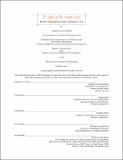Nudging Permanence
Author(s)
Loescher-Montal, Angela
DownloadThesis PDF (19.14Mb)
Advisor
Shen, Kairos
Dutta, Arindam
Terms of use
Metadata
Show full item recordAbstract
Across Berlin’s history, the street- as image, as space, as imaginary, as activity – has been, and continues to be, continuously appropriated and contested by stakeholders across the city - residents, owners, shopkeepers, tourists and others. Top-down politicians and public entities have long been grappling with how to position themselves (and their own desires) within this tension, using tools such as regulations and publicly funded projects as a form of developing an “appropriate” Straßenbild (street-image) to produce a desirable and cosmopolitan Stadtbild (city-image). As retail regulations constrain retail to interiors and developers favor larger longer-term retail contracts over smaller short-term “stunts”, I have begun to trace a shifting and unresolved paradigm. Permanence privileged over temporality. Certainty over uncertainty. Recent regulatory changes do not fall short of mentioning how current flying trade (fleamarkets, food trucks, etc.) “undermine” existing retail offerings.
This project questions the typical process of gentrification under the ideological norms of “highest and best use” and takes up a large area of land in Friedrichshain currently slated for re-development to re-imagine temporary mentalities. This project is seen as a template for similar such projects, and in the spirit of temporary uses (transient, sedentary, and inhabited), most of the tactics – building included – can be adapted and moved across the city. By formalizing their existence, the thesis traces the legal and economic framework that many resident-driven retail, exchange and re-use initiatives uses navigate to exist in the city. Ultimately, this thesis remains unfinished, but its aims remain two-fold: to investigate temporary uses in relation to their regulatory and formal tactics and to re-enforce existing temporary practices through a supporting imaginary. It hopes to shift the fantasy of tectonic retail in this existing development, and in doing so, asks the question: can we nudge the imaginary of permanence?
Date issued
2023-02Department
Massachusetts Institute of Technology. Center for Real Estate. Program in Real Estate Development.; Massachusetts Institute of Technology. Department of ArchitecturePublisher
Massachusetts Institute of Technology